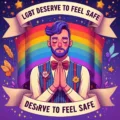What is Internalized Homophobia?
Internalized homophobia refers to the negative attitudes and beliefs about homosexuality that LGBTQ+ individuals absorb and internalize from society. It’s a complex psychological process where queer people subconsciously adopt anti-LGBTQ+ prejudices and direct them inward, often leading to shame, self-hatred, and internal conflict. Understanding and overcoming internalized homophobia is crucial for LGBTQ+ mental health and wellbeing.
The Origins and Impacts of Internalized Homophobia
Internalized homophobia typically develops from a young age as children absorb societal messages that being LGBTQ+ is wrong, unnatural, or shameful. These messages can come from family, peers, media, religious institutions, and cultural norms. Even in more accepting environments, subtle heteronormative assumptions can contribute to internalized homophobia.
The impacts of internalized homophobia can be far-reaching:
- Low self-esteem and poor self-image
- Depression, anxiety, and other mental health issues
- Difficulty forming healthy relationships
- Substance abuse as a coping mechanism
- Risky sexual behaviors
- Denial or suppression of one’s sexuality
Recognizing these impacts is an important first step in addressing internalized homophobia and promoting healing.
Recognizing Signs of Internalized Homophobia
Internalized homophobia can manifest in various ways, some subtle and others more overt. Common signs include:
- Feeling shame or disgust about one’s own sexuality
- Trying to “pass” as straight or conform to heteronormative expectations
- Avoiding LGBTQ+ spaces, media, or culture
- Criticizing or judging other LGBTQ+ people for being “too gay”
- Difficulty accepting compliments or love from same-sex partners
- Engaging in negative self-talk related to one’s sexuality
Recognizing these signs in yourself or others is crucial for addressing internalized homophobia and beginning the journey towards self-acceptance.
Overcoming Internalized Homophobia
Overcoming internalized homophobia is a process that requires patience, self-compassion, and often professional support. Here are some strategies that can help:
- Educate yourself: Learn about LGBTQ+ history, culture, and positive representations to counter negative stereotypes.
- Challenge negative thoughts: Practice identifying and questioning internalized homophobic beliefs.
- Connect with the LGBTQ+ community: Seek out supportive spaces and build relationships with other LGBTQ+ individuals.
- Seek therapy: A mental health professional, especially one experienced in LGBTQ+ issues, can provide valuable support and guidance.
- Practice self-compassion: Be kind to yourself and celebrate your identity.
- Advocate for yourself and others: Speaking up against homophobia can be empowering and healing.
Remember, overcoming internalized homophobia is a journey, not a destination. It’s okay to have setbacks, and progress often happens in small steps.
The Role of Allies in Combating Internalized Homophobia
Allies play a crucial role in combating internalized homophobia by creating supportive environments and challenging societal homophobia. Here’s how allies can help:
- Educate themselves about LGBTQ+ issues and experiences
- Challenge homophobic language and behaviors
- Advocate for LGBTQ+ rights and inclusion
- Provide unconditional support to LGBTQ+ friends and family
- Amplify LGBTQ+ voices and representation
By actively working to create a more accepting society, allies can help reduce the prevalence and impact of internalized homophobia.
FAQ: Understanding Internalized Homophobia
Q1: Can internalized homophobia affect people who are already out and proud?
A1: Yes, internalized homophobia can persist even in individuals who are openly LGBTQ+. It’s a deeply ingrained set of beliefs that can take time to fully unlearn.
Q2: How does internalized homophobia differ from general homophobia?
A2: While general homophobia is prejudice directed at LGBTQ+ people by others, internalized homophobia is when LGBTQ+ individuals direct these negative attitudes towards themselves.
Q3: Can internalized homophobia impact physical health?
A3: Yes, the stress and mental health impacts of internalized homophobia can lead to physical health issues, including weakened immune function and increased risk of certain diseases.
Q4: Is internalized homophobia more common in certain cultures or religions?
A4: Internalized homophobia can occur in any culture or religion, but may be more pronounced in environments where homophobia is more openly expressed or institutionalized.
Q5: How long does it take to overcome internalized homophobia?
A5: The process of overcoming internalized homophobia is different for everyone. It’s an ongoing journey that can take months or years, but many people report significant improvements with consistent effort and support.
Embracing Self-Love and Pride
The journey to overcome internalized homophobia is ultimately a path towards self-love, acceptance, and pride. It’s about recognizing your inherent worth and beauty as an LGBTQ+ individual. As you work through internalized homophobia, you may discover a newfound sense of freedom, authenticity, and joy in your identity.
Remember, your sexuality is a beautiful part of who you are. It deserves to be celebrated, not hidden or shamed. By embracing self-love and pride, you not only improve your own wellbeing but also contribute to a more accepting world for all LGBTQ+ people.
If you’re struggling with internalized homophobia, know that you’re not alone. Reach out for support, be patient with yourself, and take pride in every step of your journey towards self-acceptance. You are valid, you are worthy, and you deserve to live authentically and joyfully as your true self.









